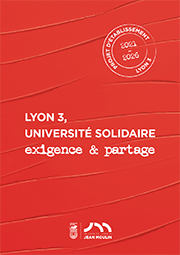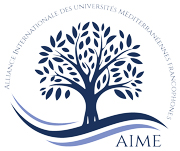AccueilRechercheProgrammes et productions scientifiquesThèsesThèses soutenuesThèses soutenues - 2006-2021Thèses soutenues - 2017
-
Partager cette page
- Recherche,
CHEN Yurong
Entre la mondialisation et l'identité nationale l'évolution du cinéma national chinois à travers la représentation du corps (1984-2012)
Publié le 14 juin 2017 – Mis à jour le 3 octobre 2017
Thèse en Etudes Transculturelles, soutenue le 12 juin 2017.
À partir de la réforme économique chinoise de 1978, et en liaison avec le changement de la société chinoise, l'échange entre le cinéma chinois et celui de l'étranger est de plus en plus fréquent. Dans ce contexte, les réalisateurs chinois veulent montrer au monde entier leurs films et leur savoir faire, en mettrant en valeur leur propre identité culturelle. Au milieu de la théorie cinématographique chinoise se développe un courant d'idée sur l'identité nationale du film chinois. Les cinéastes chinois doivent-ils s'inspirer plutôt de la mondialisation ou de l'esprit chinois, c'est une question que se posent souvent les cinéastes chinois durant ces trois dernières décennies.
Le corps est un thème caractéristique de l'identité nationale qui se situe à la jonction entre le cinéma, l'homme, la culture et la société. A travers la représentation du corps, cette thèse montre que la mondialisation et la volonté de conserver l'identité nationale influencent ensemble le développement du cinéma chinois de ces trente dernières années, surtout dans la création artistique. Grâce à la mondialisation les cinéastes chinois se rendent compte de la singularité nationale et ont la volonté de développer le cinéma chinois tout en représentant l'identité nationale. Même si la mondialisation permet aux Chinois une vision du monde plus large et plus lointaine, les films qui représentent les éléments liés à leur vie ou à leur culture locale attirent toujours les spectateurs.
From the dawn of economic reform in 1978, through the transformation of Chinese society, exchanges between foreign cinema and China are becoming more and more frequent. Chinese directors desire to share their films and cultural heritage to the world, while maintaining their own identity. A movement of new ideas about the national identity of Chinese film is developing at the heart of their cinematographic theory. Whether Chinese filmmakers should be inspired by globalization or not, is a question that they have often asked themselves in the past three decades.
The body is a special subject which shows national identity. We can witness the evolution of film, humans, culture and society, through research in the body. Through the representation of the body, this thesis shows that globalization and the desire to preserve the national identity have influenced the development of Chinese cinema in the past thirty years, mainly through an artistic aspect. Due to globalization, Chinese filmmakers are aware of the national singularity and have the will to develop Chinese cinema while representing national identity. Even though globalization allows the Chinese to take a broader view of the world, films that represent elements related to their life or local culture always attract spectators.
Mots-clés :
cinéma chinois, identité, mondialisation, corps.
Keywords :
Chinese cinema, identity, globalization, body.
Directeur(s).trice(s) de thèse : M. Jean-Pierre ESQUENAZI
Le corps est un thème caractéristique de l'identité nationale qui se situe à la jonction entre le cinéma, l'homme, la culture et la société. A travers la représentation du corps, cette thèse montre que la mondialisation et la volonté de conserver l'identité nationale influencent ensemble le développement du cinéma chinois de ces trente dernières années, surtout dans la création artistique. Grâce à la mondialisation les cinéastes chinois se rendent compte de la singularité nationale et ont la volonté de développer le cinéma chinois tout en représentant l'identité nationale. Même si la mondialisation permet aux Chinois une vision du monde plus large et plus lointaine, les films qui représentent les éléments liés à leur vie ou à leur culture locale attirent toujours les spectateurs.
From the dawn of economic reform in 1978, through the transformation of Chinese society, exchanges between foreign cinema and China are becoming more and more frequent. Chinese directors desire to share their films and cultural heritage to the world, while maintaining their own identity. A movement of new ideas about the national identity of Chinese film is developing at the heart of their cinematographic theory. Whether Chinese filmmakers should be inspired by globalization or not, is a question that they have often asked themselves in the past three decades.
The body is a special subject which shows national identity. We can witness the evolution of film, humans, culture and society, through research in the body. Through the representation of the body, this thesis shows that globalization and the desire to preserve the national identity have influenced the development of Chinese cinema in the past thirty years, mainly through an artistic aspect. Due to globalization, Chinese filmmakers are aware of the national singularity and have the will to develop Chinese cinema while representing national identity. Even though globalization allows the Chinese to take a broader view of the world, films that represent elements related to their life or local culture always attract spectators.
Mots-clés :
cinéma chinois, identité, mondialisation, corps.
Keywords :
Chinese cinema, identity, globalization, body.
Directeur(s).trice(s) de thèse : M. Jean-Pierre ESQUENAZI
Membres du jury :
M. Vincent AMIEL, Rapporteur, Professeur des universités, Université Paris 1 Panthéon Sorbonne,
M. Jean-Pierre ESQUENAZI, Professeur des universités émérite, Université Jean Moulin Lyon 3,
M. Kristian FEIGELSON, Professeur des universités, Université Sorbonne Nouvelle - Paris 3,
M. Vincent LOWY, Rapproteur, Professeur, Université de Lorraine
Président.e du jury : M. Kristian FEIGELSON
Equipe d'accueil : CEDFL
M. Jean-Pierre ESQUENAZI, Professeur des universités émérite, Université Jean Moulin Lyon 3,
M. Kristian FEIGELSON, Professeur des universités, Université Sorbonne Nouvelle - Paris 3,
M. Vincent LOWY, Rapproteur, Professeur, Université de Lorraine
Président.e du jury : M. Kristian FEIGELSON
Equipe d'accueil : CEDFL
Décision : Admis
Documentation
Mise à jour : 3 octobre 2017







